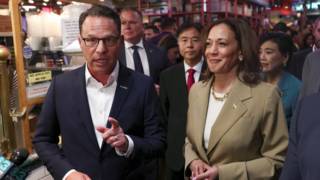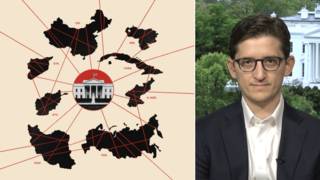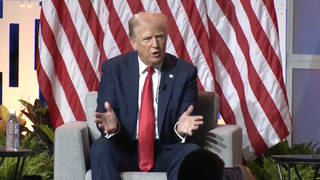This content originally appeared on Democracy Now! and was authored by Democracy Now!.
This post was originally published on Radio Free.
This content originally appeared on Democracy Now! and was authored by Democracy Now!.
This post was originally published on Radio Free.
This content originally appeared on Democracy Now! and was authored by Democracy Now!.
This post was originally published on Radio Free.
This content originally appeared on Democracy Now! and was authored by Democracy Now!.
This post was originally published on Radio Free.

Vice President Kamala Harris has selected Minnesota Governor Tim Walz, a favorite of many progressives in the Democratic Party, to be her running mate in the 2024 presidential race. They are set to hold their first joint campaign rally this evening. We get analysis from John Nichols, The Nation’s national affairs correspondent.
This content originally appeared on Democracy Now! and was authored by Democracy Now!.
This post was originally published on Radio Free.

We look at the historic $2 billion payout by the U.S. Department of Agriculture to farmers who experienced systemic discrimination when applying to the USDA’s farm loan programs. The U.S. Commission on Civil Rights has documented how USDA administrators routinely denied loans to Black farmers and other farmers of color for many decades, contributing to a massive decline in the amount of Black-owned farms in the United States. “This is a very, very historic payout for Black farmers,” says John Boyd, a fourth-generation Black farmer and founder of the National Black Farmers Association, who notes the application to receive the payout was 40 pages long. He says the group is also still fighting for a related $5 billion debt relief program. “I want people to know this is a big win, and don’t never, ever give up. The arc of justice bends slow; it bends slower for Black people, but I never gave up.”
This content originally appeared on Democracy Now! and was authored by Democracy Now!.
This post was originally published on Radio Free.
This content originally appeared on Democracy Now! and was authored by Democracy Now!.
This post was originally published on Radio Free.
This content originally appeared on Democracy Now! and was authored by Democracy Now!.
This post was originally published on Radio Free.
This content originally appeared on Democracy Now! and was authored by Democracy Now!.
This post was originally published on Radio Free.
This content originally appeared on Democracy Now! and was authored by Democracy Now!.
This post was originally published on Radio Free.

We speak with The Nation's Katrina vanden Heuvel about the prisoner swap between Russia, the United States and several other countries on Thursday that saw the release of 24 people, with 16 prisoners in Russia traded for eight Russian nationals held in the U.S., Germany and elsewhere. It was the biggest exchange of prisoners between Russia and the West since the Cold War era. Among those released are Wall Street Journal reporter Evan Gershkovich, former U.S. marine Paul Whelan and Russian American journalist Alsu Kurmasheva. Vadim Krasikov, a convicted Russian assassin who was in German custody after the 2019 killing of a Chechen dissident in Berlin, was also released and sent back to Moscow. Vanden Heuvel says it was “an extraordinary swap” that could pave the way for more diplomacy to wind down the war in Ukraine. “Negotiations and diplomacy are not about capitulation. They're about improving the conditions of a world which is too militarized and at war.”
This content originally appeared on Democracy Now! and was authored by Democracy Now!.
This post was originally published on Radio Free.

Pennsylvania Governor Josh Shapiro is reportedly at the top of the list of potential running mates for Vice President Kamala Harris in her bid for the White House. But many progressives have raised alarm about Shapiro’s record, including his support for corporate tax breaks and school vouchers, his relationship with oil and gas companies, and his demonization of pro-Palestinian protesters. “He’s been actively and vocally supportive of Israel’s war on Gaza since October 7 and prior,” says journalist Marc Lamont Hill in Philadelphia. “In every conceivable way, Josh Shapiro is not a progressive candidate.” He adds that while Shapiro’s choice as running mate would be “very frustrating,” it would also clarify the choices in the election and prevent people from projecting false hope onto Harris as many did with Barack Obama. “She very clearly is a liberal, but certainly not a progressive or a radical.”
This content originally appeared on Democracy Now! and was authored by Democracy Now!.
This post was originally published on Radio Free.
Headlines for August 02, 2024; “Simply Lying”: Marc Lamont Hill Slams Trump’s NABJ Interview, Attacks on VP Harris’s Racial Identity; Picking Shapiro as VP Would Remind Voters Kamala Harris Is Liberal, Not Progressive: Marc Lamont Hill; Prisoner Swap with Russia “Offers a Possible Pathway” to Peace in Ukraine, Says Katrina vanden Heuvel
This content originally appeared on Democracy Now! Audio and was authored by Democracy Now!.
This post was originally published on Radio Free.
This content originally appeared on Democracy Now! and was authored by Democracy Now!.
This post was originally published on Radio Free.
This content originally appeared on Democracy Now! for Broadcasters – HD MP4 and was authored by Democracy Now! for Broadcasters – HD MP4.
This post was originally published on Radio Free.
This content originally appeared on Democracy Now! and was authored by Democracy Now!.
This post was originally published on Radio Free.
This content originally appeared on Democracy Now! and was authored by Democracy Now!.
This post was originally published on Radio Free.
This content originally appeared on Democracy Now! and was authored by Democracy Now!.
This post was originally published on Radio Free.
This content originally appeared on Democracy Now! and was authored by Democracy Now!.
This post was originally published on Radio Free.

We look at a new Washington Post investigation titled “Money War” that traces the effects of U.S. sanctions under the last four presidents: Bush, Obama, Trump and Biden. According to the report, the U.S government has instituted, in some form or another, sanctions against a third of all other countries around the world, despite no clear evidence that they are effective in influencing target nations’ politics, and in fact may often entrench the power of ruling parties. We speak to Jeff Stein, one of the authors of the Post investigation, about its findings, including on the effects of sanctions in Venezuela and Iran.
This content originally appeared on Democracy Now! and was authored by Democracy Now!.
This post was originally published on Radio Free.

We play excerpts from Republican presidential nominee Donald Trump’s interview Wednesday with a panel of Black women journalists from the National Association of Black Journalists. In response to his interviewers’ questions about his record with Black Americans, Trump cast doubts on Kamala Harris’s racial identity, repeated his claims that immigrants are threatening “Black jobs,” and declared that he was the best president for the Black community since Abraham Lincoln. NABJ’s decision to host the Trump interview during its annual convention had sparked controversy within its ranks.
This content originally appeared on Democracy Now! and was authored by Democracy Now!.
This post was originally published on Radio Free.

Unrest continues to brew in Israel after a right-wing mob including members of the Knesset broke into two Israeli military bases in an effort to prevent Israeli military police from detaining nine soldiers who were under investigation for gang raping a Palestinian prisoner at the notorious Sde Teiman facility. +972 Magazine's Oren Ziv, who was at one of the bases reporting on the events, says that the support of Israeli political leaders, including some members of the Knesset who participated in the riots, and the apathy of the military police all indicate that those protesting against the soldiers' charges are “the face of the state,” expressing what are “mainstream” views in Israeli society. We also speak to Diana Buttu, a Palestinian human rights attorney who has interviewed some of the torture victims and says the extent of their abuse is “appalling.” She calls Sde Teiman a “concentration camp” that the entirety of Israeli society and the international community are “complicit” in.
This content originally appeared on Democracy Now! and was authored by Democracy Now!.
This post was originally published on Radio Free.
Headlines for August 01, 2024; “A Perilous Moment” in Middle East: Iran Vows Revenge as Israel Expands Assassination Operations; Israel’s Torture & Rape of Palestinian Prisoners Defended by Knesset Members, Far-Right Mobs; Trump Questions If Kamala Harris Is Black in Hate-Filled Interview with Black Journalists at NABJ; Money War: How the U.S. Unleashed Economic Warfare Across the Globe, from Venezuela to Iran
This content originally appeared on Democracy Now! Audio and was authored by Democracy Now!.
This post was originally published on Radio Free.
This content originally appeared on Democracy Now! and was authored by Democracy Now!.
This content originally appeared on Democracy Now! for Broadcasters – HD MP4 and was authored by Democracy Now! for Broadcasters – HD MP4.
This post was originally published on Radio Free.
This content originally appeared on Democracy Now! and was authored by Democracy Now!.
This post was originally published on Radio Free.
This content originally appeared on Democracy Now! and was authored by Democracy Now!.
This post was originally published on Radio Free.